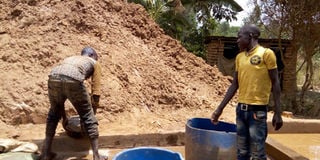Miners warned on use of mercury

Mining. Artisanal miners in Tiira Village in Busia District pun gold from mud on February 23. The miners have continued to use mercury to extract gold despite the health complications it poses. PHOTO BY DAVID AWORI
What you need to know:
- Risky. Experts say the mineral affects the mental and respiratory system of miners.
- Gold was first reported in West Nile in 1915, but commercial mining did not start until 1933. By 1965, only 148,043ounces were mined in Ankole, Kigezi and Bukedi sub-regions, producing 68, 15, 16 per cent respectively.
Busia. Environmentalists and health experts have warned small-scale miners in Busia District against the use of mercury in mining gold.
Most artisanal gold miners around the world, are fond of mixing mercury with gold ore before exposing the mixture to heat and separate gold from the rock.
Mr John Kamese, an environmentalist working with National Association of Professional Environmentalists (NAPE), told Daily Monitor on Saturday that a survey conducted last year found that the blood of some miners especially in Busia District was contaminated with mercury substance.
He said such contamination will have a negative impact on their lives in the future.
“We carried out a survey and established that the levels of mercury pollution in the blood of miners, soil, water and food crop contamination, were very high in the mining districts,” he said.
NAPE in conjunction with Uganda National Association of Community and Occupational Health (NACOH) carried out the survey between July and August, 2018 in gold mining areas of Busia, Buhweju, Mubende, Namayingo and Karamoja.
He said interventions to prevent the use of mercury in mining activities are urgent.
“Mercury has been identified as very poisonous, it is classified as neurological toxicant, which affects the nervous systems of the people, who get exposed to it,” he said.
Mr Kamese said the chemical is more dangerous to children, adding that it affects their brains, prone to tumours, memory loss and headaches.
Environmentalists have also warned that the chemical when irresponsibly disposed of from mining areas, it drains into rivers and lakes, affecting the water for aquatic life and domestic use.
Dr Bena Nanyama, the acting district health officer, Busia District acknowledged that exposure to mercury has grave health risks especially to miners with no protective gear.
According to the World Health Organisation, the health effects of exposure and inhalation of mercury vapour leads to harmful effects on the nervous, digestive and immune systems, lungs and kidneys.
Ms Birgitte Stoffersen, a Danish geologist, who is promoting mercury free artisanal and small-scale gold mining in Uganda, advised the miners to adopt the use of borax to extract gold, saying it is not dangerous to the people’s lives and the environment.
Ms Stoffersen said that scientific studies have revealed that miners get more gold by use of borax than the use of mercury.
Some of the gold miners who spoke to Daily Monitor said they are aware of the effects but lack options.
“I know of several children and old people in Tiira village, who have developed severe health complication and some are suffering from paralysis due to the effects resulting from the use of mercury,” said Mr Stephen Egindo, an artisanal miner in Busia.
Miner’s excuses
Another artisanal miner, Mr Alvin Siminyu, said the elimination of mercury in the gold mining industry will be difficult because it is cheaper and more available than borax.
In Busia, gold mining is in Tiira, Sikuda Sub-county, Amonikakenei and Alupe in Buteba Sub-county and Syanyonja in Busitema Sub-county.
Mr Hassan Odima, the LC2 chairman of Tiira Parish said the artisanal miners use bare hands to extract gold and lack protective gears such as gloves, masks, sunglasses, gumboots and helmets.
The Busia District natural resources officer, Mr Johnson Erenyu, said they have embarked on sensitising people against the use of mercury because of the major health issues recorded in the area. “Women and children are dying in the mines. We have tried to do our part but the miners have persisted,” Mr Erenyu said.
BACKGROUND
Challenges. While National Environment Management Regulations 1999 recognise the harmful effects of mercury and provide guidelines for the handling as well as transportation of such chemicals, mercury oxide is imported to the country unregulated or as a smuggled good.
Illegal. A recent study estimates that more than 400,000 people in Uganda are directly engaged, and an additional 1.5 million are benefitting indirectly.
Uganda is home to substantial gold deposits but its mining story is one that leaves a lot to be desired; the industry is mainly run by speculators and smugglers: and is riddled with corruption and illegal mining licence holders.
The UK-based environmental NGO, Global Witness, last year released a report documenting corruption, mismanagement and high level political influence in gold business in the country.
Gold was first reported in West Nile in 1915, but commercial mining did not start until 1933. By 1965, only 148,043ounces were mined in Ankole, Kigezi and Bukedi sub-regions, producing 68, 15, 16 per cent respectively.




